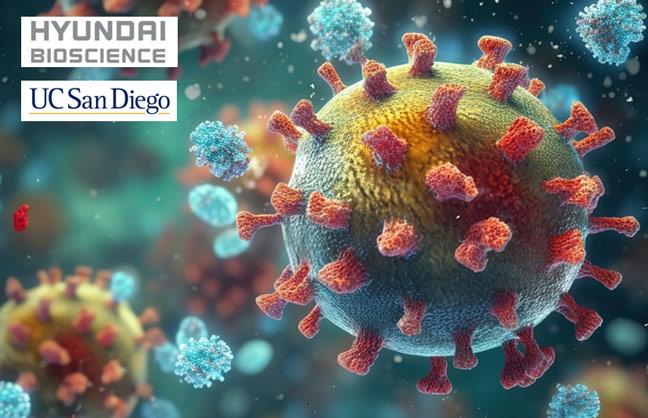The University of California, San Diego (UCSD) and Hyundai Bioscience USA have inked a Memorandum of Understanding (MoU) for the conduct of an investigator-initiated trial evaluating the efficacy of Xafty®, an antiviral based on niclosamide developed by the company’s Korean headquarters, for the treatment of “long COVID.” Professor Ajay Bharti of UCSD, a clinical trial expert and specialist in infectious diseases, will be leading this trial. Dr. Bharti’s specialized knowledge in the neurocognitive effects of viral illnesses makes him well-suited to head this investigator-initiated study.
Professor Bharti stated, “This is a fantastic opportunity for UC San Diego and Hyundai Bioscience to collaborate in tackling long COVID.” Dr. Davey Smith, Director of UCSD’s Altman Clinical and Translational Research Institute (ACTRI) and an expert in viral diseases, particularly COVID, commented on the partnership, saying, “Currently, there are no available treatments for this condition, which affects millions worldwide.”
Xafty, an oral antiviral agent, is a new drug that has improved the bioavailability of niclosamide, a compound known for its antiviral efficacy against more than 30 viruses. With plans to shortly seek for phase 3 approval with the U.S. FDA, it is presently undergoing phase 3 clinical trials in Korea that target high-risk groups for COVID-19. Xafty effectively satisfied the FDA’s major goals in the prior phase 2 trials, demonstrating a quicker rate of symptom relief than other available treatments, particularly in high-risk groups.
Reducing symptoms during acute COVID-19 is a notable achievement, said Dr. Smith, who has helped manage numerous antiviral trials for COVID-19, HIV, and Mpox. Many large-scale trials testing antivirals have not achieved such success. This could indicate that Xafty might also be effective in treating Long-COVID.
Long-COVID is a challenging condition believed to be caused by lingering viral remnants, excessive inflammation, and nerve damage. People with Long-COVID experience a variety of symptoms, including chronic fatigue, persistent inflammation, and cognitive difficulties. Current treatments often address only one part of the problem, which is why a definitive treatment for Long-COVID is still not available.
Xafty is expected to address the complex symptoms of Long-COVID by focusing on reducing inflammation and protecting nerve function, rather than just suppressing the virus. This is because niclosamide, the main ingredient in Xafty, is anticipated to offer practical therapeutic benefits through several mechanisms, including removing the virus, controlling immune hypersensitivity, and repairing nerve damage.
Hyundai Biosciences has conducted a preclinical study on Parkinson’s disease, and Xafty shown the ability to boost nerve cell repair and increase dopamine production. Compared to a group receiving the conventional Parkinson’s medicine, Madopar®, Xafty administration increased dopamine levels in an animal model of Parkinson’s disease with decreased dopamine production. This shows that Xafty may be able to considerably lessen the symptoms of nerve damage in Long-COVID patients, including brain fog and cognitive impairment.
Dr. Ajay Bharti, the Principal Investigator of the study, commented, “We already knew about niclosamide’s broad-spectrum antiviral effectiveness, but after seeing the data that Xafty, which improves the long-standing issue of bioavailability, showed excellent symptom improvement in a COVID-19 clinical trial—particularly in high-risk groups—we decided to explore its use for treating Long-COVID.” He added, “Specifically, the fact that Xafty was able to repair neurons and boost dopamine production in a preclinical Parkinson’s study, resulting in higher dopamine levels compared to the Madopar® control group, was a key factor in initiating this clinical study.”
Dr. Smith concluded, “This study aims to confirm whether niclosamide can address the complex symptoms of long-term COVID-19 through various mechanisms, such as neuroprotection, reduced inflammation, and viral suppression”. It would be a historic accomplishment if the clinical trial were to be successful and offer long-term COVID sufferers a workable treatment option.”


